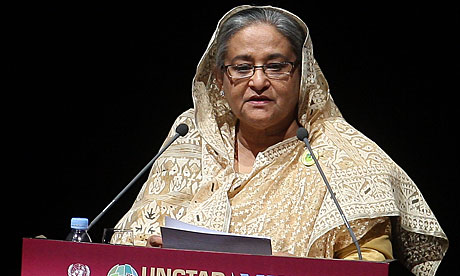
Bangladesh's prime minister, Sheikh Hasina, claimed Ilias Ali may be hiding on the orders of his own party. Photograph: Faisal Al-Tamimi/AFP/Getty Images
Police in Bangladesh used baton charges, live bullets and teargason Sunday in clashes with demonstrators protesting against the alleged abduction of a senior politician. The violence was the most acute for many months in the unstable state.
In Dhaka, the capital, dozens of small devices were reported to have exploded and 20 arrests were made. In the north-eastern city of Sylhet, 12 people were reported to have been injured and more than 50 detained in running battles. On Sunday night a tense calm had been established, although tens of thousands of security personnel remained deployed across the country in anticipation of further clashes on Monday.
The crisis was sparked by the disappearance last Tuesday of Ilias Ali, a key organiser with the Bangladesh Nationalist party (BNP). Ali was the latest in a series of political activists who have apparently been abducted, raising fears of a concerted campaign of intimidation aimed at opposition politicians. At least 22 people have gone missing so far this year, the local human rights organisation Ain o Salish Kendra said. In 2011, the number was 51. Estimates of the exact number vary though all indicate a rising overall total.
Many local and international campaigners have blamed security forces, accusing the paramilitary Rapid Action Battalion (Rab) and local police of eliminating opposition figures to benefit the administration of Sheikh Hasina, the prime minister.
Spokesmen from the Rab have denied the charge, saying that many of those found dead or who have disappeared were involved in crime and killed by associates or rivals. The director of the Rab's legal wing, Commander Mohammed Sohail, said an operation had been launched to recover Ali and a search was continuing.
Speaking in Dhaka last week, Hasina suggested Ali might have been "hiding somewhere" on the orders of his party. Ministers described his disappearance as "sad" and "unexpected".
Police officials contacted by the Guardian refused to comment on the case.
Ali's wife, Tahsina Rushdir, said her husband, a veteran activist who had risen through the ranks of the BNP, had been campaigning for the party in Sylhet before he disappeared. "He told me that the government was making a list of people who were being critical about them. He wouldn't be picked up this way unless he had posed a threat to the government," she said. "The waiting is very difficult."
More than 30 people were injured in clashes between opposition activists and the police on the streets of Dhaka last week following the news that Ali was missing.
Tensions in the south Asian state, home to 160 million people, have been building for months. Runaway inflation, rising inequality and recent corruption charges against some ministers have all combined to undermine the popularity of the government, in power since winning a landslide victory in 2008.
Politics in Bangladesh, which won independence from Pakistan after a bloody conflict in 1971, has been marked for decades by the personal rivalry of Sheikh Hasina, head of the Bangladesh Awami League, and Khaleda Zia, leader of the BNP. This has not however prevented economic growth rates that are among south Asia's highest and some significant improvements in areas such as education. But governance and the rule of law remain weak. Adilur Rahman Khan, secretary of Bangladeshi human rights group Odhikar, said the disappearances were "a result of the impunity granted to the law enforcement [agencies] for the last 41 years". Dr Iftekhar Uz-Zaman, executive director of the Bangladesh chapter of Berlin-based Transparency International, blamed "growing partisan political influence" that was eroding "the capacity of the state to promote rule of law, justice, equality and basic human rights of the people".
Among the recent missing are three student leaders from the BNP. The body of a trade union organiser, apparently tortured, was found after he disappeared on 4 April. Two opposition activists, both members of an Islamic student organisation, disappeared in February.
Shafiq Ahmed, minister for law, justice and parliamentary affairs, said that a full investigation was under way to locate all those who have disappeared, and that allegations that the government could be responsible in any way for abductions were motivated by "an interest to gain public attention".
The minister also rejected criticism of the government's economic record. "The economy [in Bangladesh] is better than many countries in the face of global economic depression," he said.
The Rab has received training from British police, the Guardian revealed in 2010. Details of the programme appeared in a number of cables released by WikiLeaks. The Rab is believed to be responsible for up to 1,000 extrajudicial killings since being formed eight years ago.
In its 2012 annual report Human Rights Watch said ministers have denied that such incidents occur, even when the government's own investigations found evidence of wrongdoing.
No comments:
Post a Comment